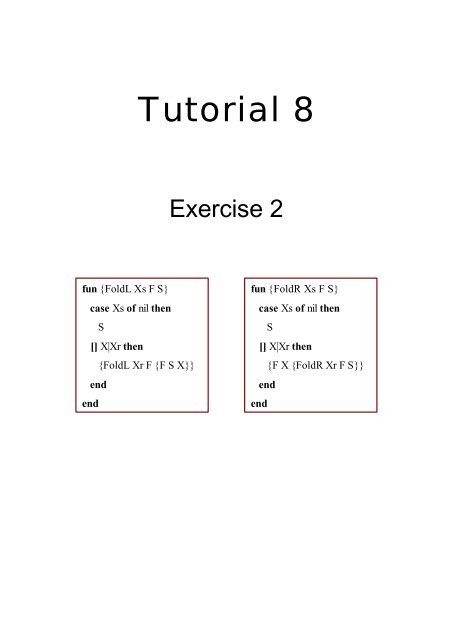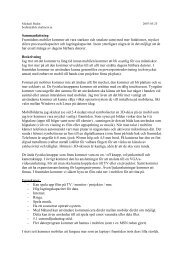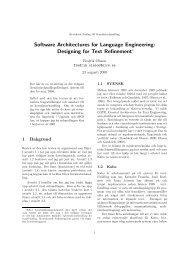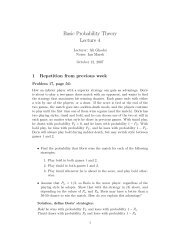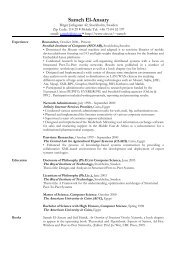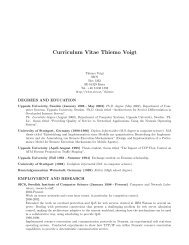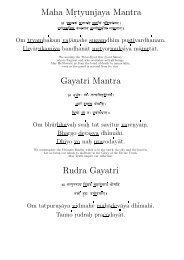end - SICS
end - SICS
end - SICS
You also want an ePaper? Increase the reach of your titles
YUMPU automatically turns print PDFs into web optimized ePapers that Google loves.
Tutorial 8<br />
Exercise 2<br />
fun {FoldL Xs F S}<br />
case Xs of nil then<br />
S<br />
[] X|Xr then<br />
{FoldL Xr F {F S X}}<br />
<strong>end</strong><br />
<strong>end</strong><br />
fun {FoldR Xs F S}<br />
case Xs of nil then<br />
S<br />
[] X|Xr then<br />
{F X {FoldR Xr F S}}<br />
<strong>end</strong><br />
<strong>end</strong>
The idea is to show how FoldL and FoldR will execute<br />
given the following function definitions:<br />
fun {Cons X Xr} X|Xr <strong>end</strong><br />
fun {Snoc Xr X} X|Xr <strong>end</strong><br />
The following examples will be demonstrated:<br />
{Browse {FoldL [a b c d] Snoc nil}}<br />
{Browse {FoldR [a b c d] Cons nil}}<br />
{Browse {FoldL [a b c d] Cons nil}}<br />
{Browse {FoldR [a b c d] Snoc nil}}<br />
{FoldL [a b c d] Snoc nil}<br />
{Snoc nil a}<br />
a|nil<br />
{Snoc a|nil b}<br />
b|a|nil<br />
{Snoc b|a|nil c}<br />
c|b|a|nil<br />
{Snoc c|b|a|nil d}<br />
d|c|b|a|nil<br />
Our first call to the function FoldL with the function Snoc<br />
(se definition above) and initial accumulator initated to nil.<br />
It will recurse the list [a b c d] from left to right!<br />
FoldL will call our function Snoc with the accumulator<br />
(nil) and the head of the list (a)<br />
Snoc will simply return X|Xr, which yields to the new<br />
accumulator value a|nil<br />
FoldL will now recurse and call our function Snoc with the<br />
accumulator (a|nil) and the head of the current list (b)<br />
Snoc will simply return X|Xr, which yields to the new<br />
accumulator value b|a|nil<br />
FoldL will now recurse and call our function Snoc with<br />
the accumulator (b|a|nil) and the head of the current list<br />
(c)<br />
Snoc will simply return X|Xr, which yields to the new<br />
accumulator value c|b|a|nil<br />
FoldL will now recurse and call our function Snoc with the<br />
accumulator (c|b|a|nil) and the head of the current list (d)<br />
Snoc will simply return X|Xr, which yields to the new<br />
accumulator value d|c|b|a|nil<br />
[d c b a]<br />
Since FoldL has recursed the whole list [a b c d], it is<br />
now done and returns the final accumulator, and we<br />
have our result!<br />
ali@sics.se 2
{FoldR [a b c d] Cons nil}<br />
{Cons d nil}<br />
d|nil<br />
{Cons c d|nil}<br />
c|d|nil<br />
{Cons b c|d|nil}<br />
b|c|d|nil<br />
{Cons a c|b|a|nil}<br />
a|b|c|d|nil<br />
Our first call to the function FoldR with the function Cons<br />
(se definition above) and initial accumulator initated to nil.<br />
It will recurse the list [a b c d] from right to left!<br />
FoldR will call our function Cons with the accumulator<br />
(nil) and <strong>end</strong> of the list (d) (notice the order is different<br />
for FoldR)<br />
Cons will simply return X|Xr, which yields to the new<br />
accumulator value d|nil<br />
FoldR will now recurse and call our function Cons with<br />
the accumulator (d|nil) and the <strong>end</strong> of the current list (c)<br />
Cons will simply return X|Xr, which yields to the new<br />
accumulator value c|d|nil<br />
FoldR will now recurse and call our function Cons with<br />
the accumulator (c|d|nil) and the <strong>end</strong> of the current list<br />
(b)<br />
Cons will simply return X|Xr, which yields to the new<br />
accumulator value b|c|d|nil<br />
FoldL will now recurse and call our function Cons with the<br />
accumulator (b|c|d|nil) and the <strong>end</strong> of the current list (a)<br />
Cons will simply return X|Xr, which yields to the new<br />
accumulator value d|c|b|a|nil<br />
[a b c d]<br />
Since FoldR has recursed the whole list [a b c d], it is<br />
now done and returns the final accumulator, and we<br />
have our result!<br />
ali@sics.se 3
Notice that returning X|Xr is the same as returning the tuple<br />
’|’( X Xr). So if X=’|’(Y Yr), then ’|’(X Xr) yields to<br />
’|’(’|’(Y Yr) Xr) which is the same as (Y|Yr)|Xr<br />
{FoldL [a b c d] Cons nil}<br />
{Cons nil a}<br />
nil|a<br />
{Cons nil|a b}<br />
(nil|a)|b<br />
{Cons (nil|a)|b c}<br />
((nil|a)|b)|c<br />
{Cons ((nil|a)|b)|c d}<br />
(((nil|a)|b)|c)|d<br />
Our first call to the function FoldL with the function Cons<br />
(se definition above) and initial accumulator initated to nil.<br />
It will recurse the list [a b c d] from left to right!<br />
FoldL will call our function Cons with the accumulator<br />
(nil) and the head of the list (a)<br />
Cons will simply return X|Xr. OBS! Cons has a<br />
different order for its parameters and therefore the value<br />
returned will be nil|a<br />
FoldL will now recurse and call our function Cons with<br />
the accumulator (nil|a) and the head of the current list (b)<br />
Cons will simply return X|Xr, which yields to the new<br />
accumulator value (nil|a)|b<br />
FoldL will now recurse and call our function Cons with<br />
the accumulator (nil|a)|b and the head of the current list<br />
(c)<br />
Cons will simply return X|Xr, which yields to the new<br />
accumulator value ((nil|a)|b)|c<br />
FoldL will now recurse and call our function Cons with the<br />
accumulator ((nil|a)|b)|c and the head of the current list (d)<br />
Cons will simply return X|Xr, which yields to the new<br />
accumulator value (((nil|a)|b)|c)|d<br />
(((nil|a)|b)|c)|d<br />
Since FoldL has recursed the whole list [a b c d], it is<br />
now done and returns the final accumulator, and we<br />
have our result!<br />
ali@sics.se 4
Notice that returning X|Xr is the same as returning the tuple<br />
’|’( X Xr). So if X=’|’(Y Yr), then ’|’(X Xr) yields to<br />
’|’(’|’(Y Yr) Xr) which is the same as (Y|Yr)|Xr<br />
{FoldR [a b c d] Snoc nil}<br />
{Snoc d nil}<br />
nil|d<br />
{Snoc c nil|d}<br />
(nil|d)|c<br />
{Snoc b (nil|d)|c}<br />
((nil|d)|c)|b<br />
{Snoc a ((nil|d)|c)|b}<br />
(((nil|d)|c)|b)|a<br />
Our first call to the function FoldR with the function Snoc<br />
(se definition above) and initial accumulator initated to nil.<br />
It will recurse the list [a b c d] from right to left!<br />
FoldR will call our function Snoc with the accumulator<br />
(nil) and the <strong>end</strong> of the list (d)<br />
Snoc will simply return X|Xr. OBS! Cons has a<br />
different order for its parameters and therefore the value<br />
returned will be nil|d<br />
FoldR will now recurse and call our function Snoc with<br />
the accumulator (nil|d) and the <strong>end</strong> of the current list (c)<br />
Snoc will simply return X|Xr, which yields to the new<br />
accumulator value (nil|d)|c<br />
FoldR will now recurse and call our function Snoc with the<br />
accumulator (nil|d)|c and the <strong>end</strong> of the current list (b)<br />
Snoc will simply return X|Xr, which yields to the new<br />
accumulator value ((nil|d)|c)|b<br />
FoldR will now recurse and call our function Snoc with<br />
the accumulator ((nil|d)|c)|b and the <strong>end</strong> of the current<br />
list (a)<br />
Snoc will simply return X|Xr, which yields to the new<br />
accumulator value (((nil|d)|c)|b)|a<br />
(((nil|d)|c)|b)|a<br />
Since FoldR has recursed the whole list [a b c d], it is<br />
now done and returns the final accumulator, and we<br />
have our result!<br />
ali@sics.se 5


